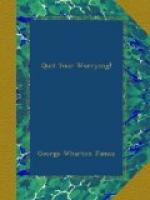I do not ask to see the distant scene,
One step enough for me.
Furthermore, the evil we dread for to-morrow may never come. Every man’s experience demonstrates this. The bill for which he has not money in the bank is met by the unexpected payment of an account overdue, or not yet due. Hence if fears come of the morrow, if we are tempted to worry about a grief that seems to be approaching, let us resolutely cast the temptation aside, and by a full occupation of mind and body in the work of the “now,” engage ourselves beyond the possibility of hearing the voice of the tempter.
When one considers the words that are regarded as synonymous with “worry,” or that are related to it, he sees what cruelties lurk in the facts behind the words. To grieve, fret, pine, mourn, bleed, chafe, yearn, droop, sink, give way to despair, all belong to the category of worry.
Phrases like “to sit on thorns,” “to be on pins and needles,” “to drain the cup of misery to the dregs,” show with graphic power the folly and curse of worry. Why should one sit on thorns, or on pins and needles? If one does so accidentally he arises in a hurry, yet in worrying, one seems deliberately, with intent, to sit down upon prickles in order to compel himself to discomfort, distress, and pain. Is there any wisdom, when one has the cup of misery at his lips, in deliberately keeping it there, and persistently drinking it to the “very dregs”? One unconsciously feels like shouting to the drinker: “Put it down, you fool!” and if the harsh command be not instantly obeyed, rushing up and dashing it out of the drinker’s hand.
Take a few more words and look at them, and see how closely they are related to worry,—to be displeased, fretted, annoyed, incommoded, discomposed, troubled, disquieted, crossed, teased, fretted, irked, vexed, grieved, afflicted, distressed, plagued, bothered, pestered, bored, harassed, perplexed, haunted. These things worry does to those who yield themselves to its noxious power.
Worry deliberately pains, wounds, hurts, pinches, tweaks, grates upon, galls, chafes, gnaws, pricks, lancinates, lacerates, pierces, cuts, gravels, corrodes, mortifies, shocks, horrifies, twinges and gripes its victims.
It smites, beats, punishes, wrings, harrows, torments, tortures, racks, scarifies, crucifies, convulses, agonizes, irritates, provokes, stings, nettles, maltreats, bites, snaps at, assails, badgers, harries, persecutes, those who give it shelter.
Is it not apparent, then, that the only course open for a sensible man or woman is to
QUIT WORRYING.
CHAPTER V
THE NEEDLESSNESS AND USELESSNESS OF WORRY




